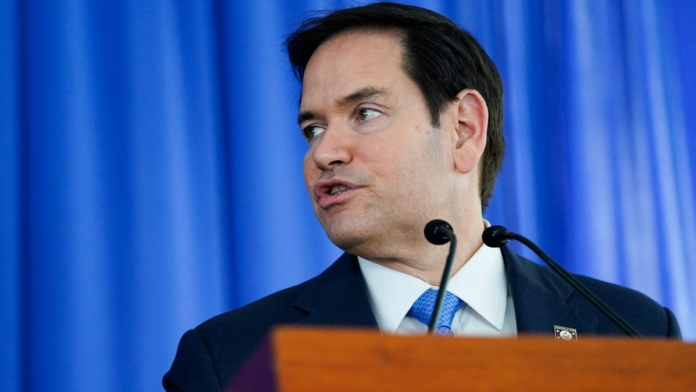WASHINGTON — A plan for the Trump administration to bar entry into the United States from foreign nationals whose countries do not meet its vetting standards has been indefinitely postponed, with no new date set.
The State Department said Monday it is continuing to work on the report that would serve as the basis for the anticipated visa restrictions but could not say when it would be ready. President Donald Trump signed an executive order on his first day in office requesting recommendations on what new visa restrictions should be applied to which countries by March 21.
Trump gave his administration 60 days to submit a report „identifying countries throughout the world for which vetting and screening information is so deficient as to warrant a partial or full suspension on the admission of nationals from those countries.“
A list of more than 40 nations, including Iran, Russia and Venezuela, were reportedly under consideration for full or partially restricted travel to the U.S. as part of the mandate, which built on a travel ban Trump enacted during his first term and the Supreme Court upheld.
But the due date for an official list to be submitted came and went without an announcement from the White House, and the State Department’s top spokesperson declared the deadline no longer in effect.
State Department spokeswoman Tammy Bruce said at a briefing on Monday that a new date for the recommendations had not been set. She called the original deadline, which was set by Trump’s executive order, a „target date that no longer applies“ without offering an explanation.
„The State Department like every department in President Trump’s administration are acting on executive orders, including this one,“ Bruce said.
It was not immediately clear why the administration postponed the report that would lay the groundwork for Trump to enact a new travel ban and impose visa restrictions on foreign nationals from select countries.
„I can’t speak to that. But I can tell you that we’re working on what the executive order asked for,“ Bruce said, describing them as „restrictions on other countries“ of „whether or not they meet the standard of security and vetting that’s required for entry into the United States“ rather than a travel ban.
Asked to clarify if a new date had been set, she said „no,“ before adding, „Again, because there’s not a date, it doesn’t mean that it’s not being worked on. And so we are all working to implement what President Trump has ordered.“
The White House declined to provide a comment.
At a previous briefing, on the report’s March 21 due date, Bruce told reporters the deadline was no longer that day. „I can’t tell you the specifics, but it’s – don’t expect… that today is a day that something will have to come out,“ she said.
Trump issued multiple bans on travel from seven Muslim-majority countries during his first term, with each of them facing legal challenges, before the Supreme Court ruled in his favor in 2018.
In his January executive order, he told U.S. officials to use the standards that were in place when he left office as a baseline for reestablishing screening and vetting procedures.
Trump’s order tasked the secretary of state, director of national intelligence, attorney general and secretary of homeland security with jointly submitting recommendations for a list of countries that would be slapped with the visa restrictions.
He also told them to identify „how many nationals from those countries have entered or have been admitted“ into the country since former President Joe Biden took office and directed DHS to „take immediate steps to exclude or remove“ foreign national from the country who do not meet the current administration’s vetting standards.
Secretary of State Marco Rubio told reporters Friday that the department is doing daily reviews to revoke visas when a person undertakes activities counter to the national interest or foreign policy of the U.S. government or the person is involved in criminal activity.
“My standard — If we knew this information about them before we gave them a visa, would we have allowed them in?” Rubio said. “And if the answer is no, then we revoke the visa.” He said upward of 300 student visas have been affected.
Last week, Immigration and Customs Enforcement detained 30-year-old Rumeysa Ozturka, a Turkish graduate student studying at Tufts University near Boston. The Department of Homeland Security told USA TODAY that she supported the terrorist group Hamas, which runs the Gaza Strip and has been at war with Israel.
Days before that, Customs and Border Patrol deported Dr. Rasha Alawieh, a Lebanese national who had a work visa to practice at Brown Medicine in Rhode Island. Customs and Border Protection alleged her phone had content that was sympathetic to the terrorist group Hezbollah.
And Immigration and Customs Enforcement detained Syria-born Mahmoud Khalil, who was one of the pro-Palestinian leaders of the encampment protests at Columbia University last year. Another Columbia student, Korean-born Yunseo Chung, sued the Trump administration to maintain her legal permanent residency in the U.S.
Rubio said student visas are among those being reviewed but he wasn’t sure if they were the only ones. “We’ve also identified people that have criminal charges and even while in the country, and still have active visas. Some are unrelated to any protests and are just having to do with potential criminal activity.”
